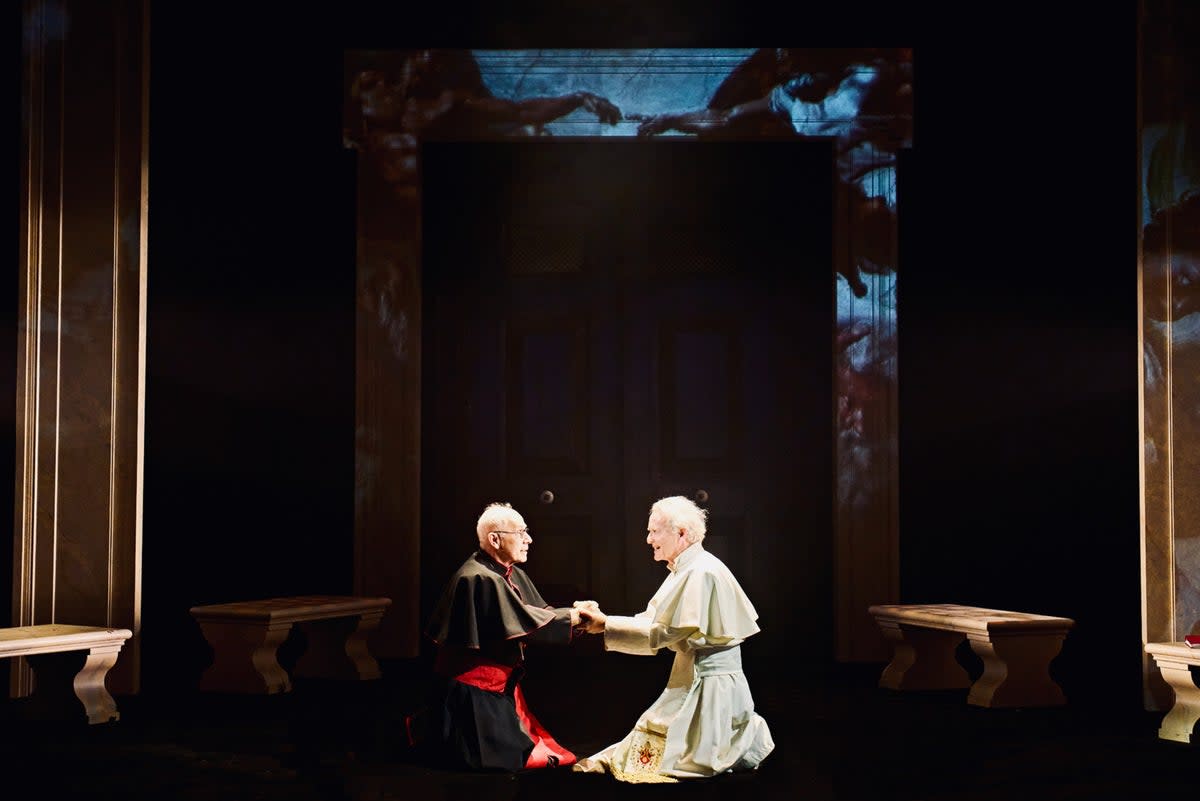The Two Popes at Rose Theatre review: this tale of two pontiffs is decidedly undivine

On screen, writer Anthony McCarten turns stories about real, complex figures – Stephen Hawking, Freddie Mercury, Winston Churchill – into tidily packaged entertainments. He does the same in this 2019 play about the resignation of the traditionalist Bavarian Pope Benedict XVI in 2013 and his replacement by the “liberal” Argentine Cardinal Jorge Bergoglio, now Pope Francis.
It’s an old-fashioned piece of work, a vehicle for two veteran actors to barnstorm through issues of passion and principle, which promises to lift the veil of the Vatican’s arcane secrecy while actually doing no such thing. The history of the papacy and its contemporary problems are parcelled into two neat acts of an hour each, the script’s emotional peaks and comic moments precisely calibrated to elicit a response, like “amens” in a sermon.
Fernando Meirelles’ Netflix adaptation (also 2019) opened the whole thing out and featured the starry double-act of Anthony Hopkins (Benedict) and Jonathan Pryce (Bergoglio). Here, director James Dacre has stalwart character actors Anton Lesser and Nicholas Woodeson reprising the roles from his premiere staging at Northampton. Both men are old stage pros, though Lesser may be more familiar to contemporary audiences for his roles in The Crown and Game of Thrones. We are in safe, professional hands all round, but the play feels comparatively small and stale.

It begins with setup scenes where each man dumps a load of exposition - a Pope hasn’t resigned since 1294, you know - and backstory onto a different, functional nun. Benedict is persnickety, bookish but whimsical (he’s obsessed with a TV show about a dog detective), tired and ill at 86. Bergoglio, 75, wants to retire as Buenos Aires’ champion of the poor, but retains his sense of mission, along with a love of football, ABBA songs and tango dancing.
Together, they wrangle heatedly about doctrine, compassion and the decline of faith in the West. The church’s attitude to divorce and homosexuality are ticked off, while its gross mishandling of sexual abuse by priests rears its ugly head twice: the second time in a joint confession in the empty Sistine Chapel. Each man feels guilt. Each eventually realises that he, and the church, must change. See what I mean about neatness?
Lesser’s bird-like beadiness suits Benedict, although at 70 he’s a bit too spry for the part. Woodeson, instantly likeable in a way Lesser never strives to be, sinks into Bergoglio’s ebullience as if it’s a cosy, familiar armchair. At times each of them lets mannerism or accent take over from character, possibly because the script leaves little room for nuance.
Given the momentous events and issues it deals with, the whole thing feels oddly bloodless, but at least the timing is apposite. There are rumours that Francis himself wants to resign the papal throne, leading to the prospect – with Benedict still alive at 95 – of three living popes. Now that’s a sequel I’d watch.
Rose Theatre, to September 23; rosetheatre.org


